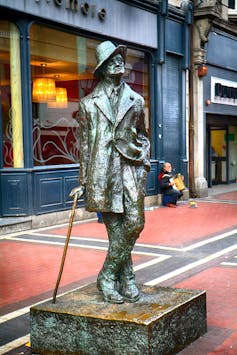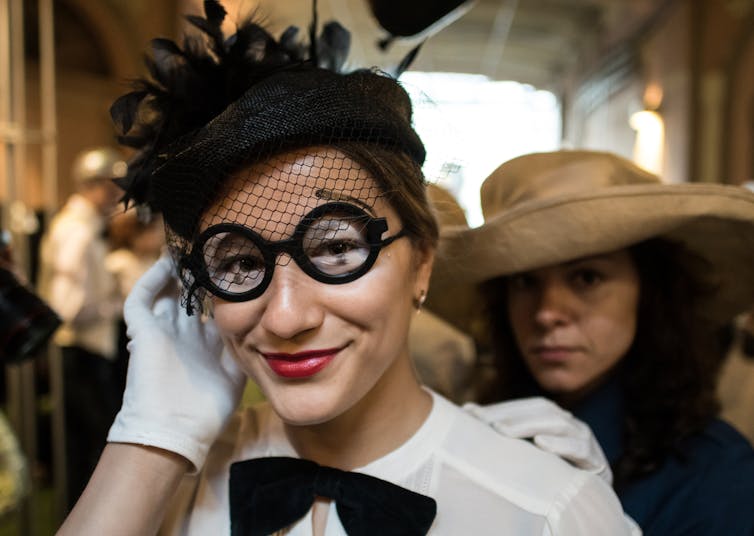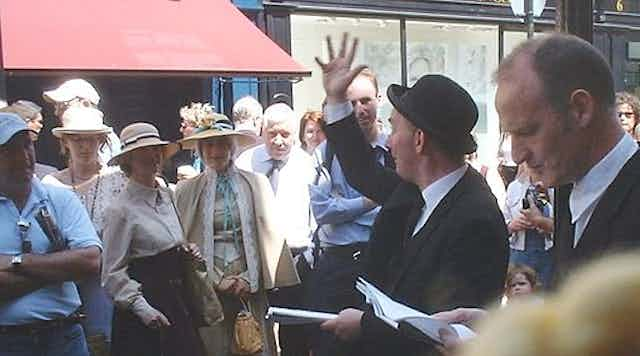Bloomsday is an annual celebration of James Joyce’s epic novel, Ulysses. Many of Joyce’s devotees will be flocking to Dublin, the city in which Ulysses is set, to retrace the steps of Joyce’s Leopold Bloom and other Dubliners featured in the encyclopaedic text.
Joyce’s “little story of a day” begins at 8am on June 16 at the Martello Tower in Sandycove, Dublin, home of Stephen Dedalus (and briefly home to Joyce himself, in September 1904) and ends at 2am at 7 Eccles Street (home to Leopold and Molly Bloom). The Irish tourist board will, no doubt, welcome Joycean revellers with open arms – the VisitDublin website provides a one-line synopsis of Ulysses, urging those unfamiliar with the text not to fret, and offers style advice for those wishing to look the part as they explore the city and enjoy readings, street theatre – and an obligatory gorgonzola sandwich.
Without Dublin, there would be no Ulysses. Joyce’s recreation of the city is painstakingly detailed – as he stated, himself, Dublin could be rebuilt “brick by brick” using his novel as a guide.
European son
Despite the importance of Ireland’s capital to Joyce’s life and literature, Ulysses was written in continental Europe. Joyce draws attention to this fact by closing his book with the words: “Trieste-Zurich-Paris, 1914-1921”. Joyce was self-consciously European – he studied modern languages and was inspired by writers such as the French novelist Gustave Flaubert and the Norwegian playwright Henrik Ibsen. In Joyce’s posthumously published novel Stephen Hero (1944), Ibsen is described as “the first poet of the Europeans”.

Ulysses focuses on Leopold Bloom, a patriotic Irishman with Hungarian Jewish ancestry and a wife born in Gibraltar, and Stephen Dedalus, a native Dubliner with a Greek surname who drinks his tea black in the Parisian style. Joyce mocks unthinking nationalism, xenophobia, anti-Semitism and other forms of bigotry. Mr Deasy, a unionist head teacher who exclaims that “England is in the hands of the Jews” is portrayed as nothing more than a classroom bore, while “The Citizen”, a nationalist extremist, is depicted as a narrow-minded cyclops. He asks Bloom what his nation is, to which Bloom replies “I was born here. Ireland”, then aggressively clears “the spit out of his gullet”.
Freedom and tolerance
Bloom is painted – in a more positive light – as a peacemaker and mediator; he is in favour of “moderation” and capable of seeing things the “other way round”. He upholds a philosophy of socialist utopianism, advocating for “free money, free rent, free love and a free lay church in a free lay state” for all.
In Ulysses, Joyce throws light on the complexities of national identity and the ways in which our senses of place and ancestral history can become intertwined with our sense of self, often with negative results. Indeed, as Stephen exclaims in response to Mr Deasy’s bigotry: “History is a nightmare from which I am trying to awake.”
As well as espousing the virtues of tolerance and inclusivity within his text, Joyce brings people of different backgrounds and nationalities together in the real world via their love for his literature. Ulysses has been translated into multiple languages, including Chinese and Korean. Alongside the International James Joyce Foundation, there are active Joyce societies in Japan, Spain, Italy, the US, Switzerland and elsewhere.

From Dublin to the world
While Dublin remains a hotspot for Bloomsday activity, the day is now celebrated across the world. There are Bloomsday events this year in nations including Australia, the UK, the US, Canada, France, Italy, Switzerland, Germany, Turkey, Croatia, Poland, Hungary, Russia, Hong Kong, Brazil, Lebanon, Georgia and Israel, to name but a few – click here for a map of this year’s events). My own passion for Joyce has so far taken me to conferences and events in Dublin, Paris, Trieste, Buffalo, Los Angeles, Prague and London. At each event I have made new friends and reconnected with old ones.
With Brexit looming, the question of what it means to be European – and what it means to be international – is more pertinent than ever. Joyce, with his open outlook, his literature of inclusivity and tolerance, and his ability to unite people across the globe, offers a fruitful way in, and a fitting occasion for us to begin to disentangle and deliberate on this continental conundrum.

